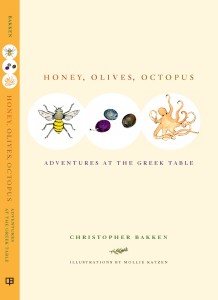If you can’t travel to Greece this summer, go down to your local bookstore and order a copy of Christopher Bakken’s Honey, Olives, Octopus: Adventures at the Greek Table. When it arrives, set up your own little table under a shade tree in the back yard. Fill a bowl with olives — preferably the black, wrinkly ones from Thasos, though any Greek variety will do! Fill your glass with wine. When you are ready, open your book, take a deep breath, and drop into the backseat of the little car driven madly by Tasos of Thasos, as he careens around switchbacks snaking along his island’s southern point, taking him, the author, and you, to his olive groves for a day of harvest.
Thus begins Bakken’s culinary travelogue, which takes us to Thasos and Crete, Serifos and Naxos, Chios and Kythira, tasting intensely local breads, cheeses, olives, roasted goat, Imam bayildi, raki, barbounia, fasolada. Bakken leads the way as we stroll passed white-washed houses, and dive for octopus in cobalt seas, and accept spoon sweets from black-clad, wizened women. We sing with Cretans and throw our legs up high, our dance fueled by raki and kefi until dawn.
But Bakken, unlike so many culinary travel writers whose books now crowd the shelves, doesn’t stop at such outward, simply nostalgic signs of Greece. He has written an idyll, not a fairytale. He does not block out Athens, or the European Union, or the crushing economy, as no Greek can for very long. He lets the modern world intrude quietly but profoundly, as it does, in village life: through the snail making its imperceptible way up the leg of a plastic garden chair; through the stainless steel counters installed in the kitchens of an old taverna; through the roar of an Italian-made, gas-powered tsougrana (mechanical olive-picker) that drowns out, as Bakken writes, all “placid conversation” and precludes “the traditional harvest songs I imagined we’d sing.”
But again, the modern world under Bakken’s pen is about more than these outward sights and sounds. It’s Kyria Eleftheria, a sublime bread-maker from Crete, sharing a quiet meal with Bakken in her cottage, momentarily engulfed by a loneliness that advances and retreats like the tides, her children long gone, having been lured away by the promises of the city. It’s about Maria of Serifos, uncharacteristically soured into suspicion by experience, accusing Bakken of trying to plunder her culinary secretes for his own profit. It’s about the old woman who trudges up the hill each night to light her abandoned village’s only street lamp, so she doesn’t feel so alone. It’s about Eleni and Yannis, stewards of Kythira’s bees, staving off the colony collapse disorder threatening hives and humans world-wide.
Bakken understands this darker side. He feels the deep sadness and inherited anxiety carried by a people who have endured centuries of catastrophic earthquakes and volcanic eruptions, brutal wars and military occupations, and more years of hunger than of plenty. He understands the Greek resignation in the oft-heard phrase, “alla ti na kanoume” (“but what can we do?”) He also understands the inextinguishable optimism that allows the three brothers-in-spirit, Tasos and Bakken and Georgos, whose cancer has recently returned, to dream up plans of conquering Mount Olympus next autumn, and to seal their promises with a toast, entangled in grief and joy, heard at the end of every glorious Greek summer, to “tou xronou,” to “next year.”
Bakken is a poet, who was raised in Wisconsin and now teaches at Allegheny College in Pennsylvania. He first visited Greece more than 20 years ago, and has been returning whenever possible ever since. When he writes of Chios and Naxos and Crete, of Tasos and Georgos and Eleftheria, I respond with deep recognition. I know that the portrait he offers is not just accurate, which is easy, but true. And I am grateful that he has written this book. At a time when the country is wracked again by pain and anxiety over an uncertain future, we really need to be reminded of everything that is beautiful about Greece and its Greeks, from its hard, scrubby mountains, fertile valleys and breathtaking seas to its spirit of endurance, generosity and hope.
When I finally close the cover on Bakken’s book, I do so reluctantly, saddened to leave the places I’ve visited and the friends I’ve made. Such is Bakken’s power, and his gift. So go down to your local bookstore and when your book arrives, set out a little table under a shade tree in your yard. Fill a bowl with olives and a glass with wine. Open the book’s covers, take a deep breath, and drop down into the car driven madly by Tasos of Thasos, joining him as he careens toward his olive groves and an increasingly uncertain, but still hopeful, future.





![P1020330[1]](https://mygreektable.files.wordpress.com/2012/01/p10203301.jpg?w=300&h=225)





